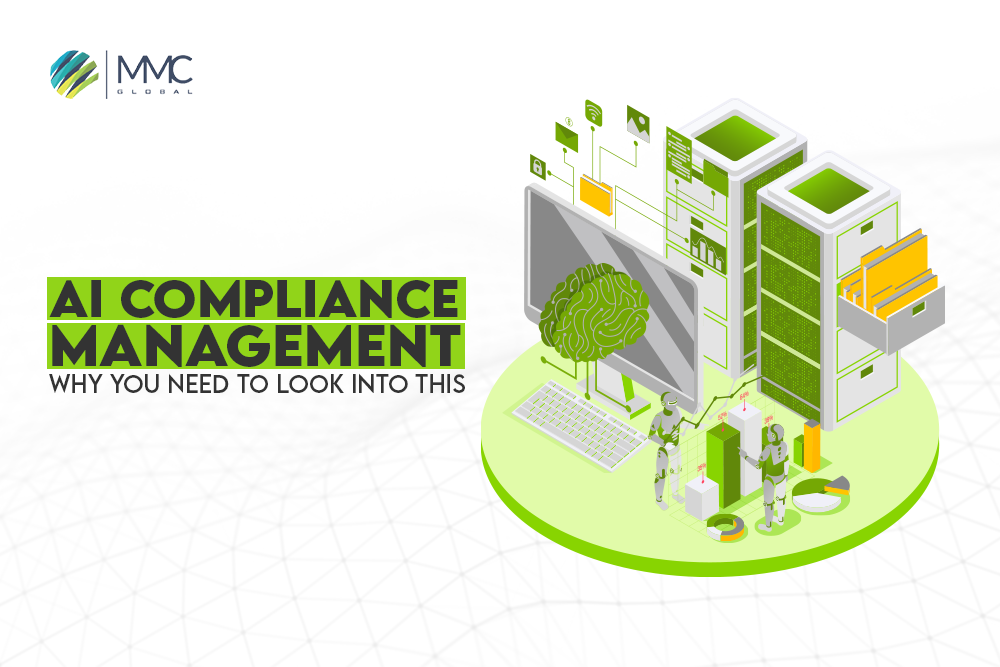AI Compliance Management: Why You Need To Look Into This


The unwavering AI technology is making a splash across industries and supporting dynamic areas of businesses. It includes administration, HR, finance, manufacturing, and so on. Integrating AI in existing systems or introducing AI-powered solutions in the workforce requires complete AI compliance that meets the industry standard. Moreover, AI compliance management’s checks and balances help organizations avoid fines, penalties, and other law enforcement in case of not meeting standard compliance. To integrate legitimate AI solutions within your workspace, you must understand in-depth regulations to foster security and protection from illegal activities.
In this blog, you will discover AI Compliance management from scratch, its significance, and its challenges. Let’s read till the end.
What is AI Compliance Management?
Every business action complies with adequate rules and regulations to limit the standards. Similarly, AI compliance is a set of rules and regulations that legalize the use of AI in applications and systems in a socially acceptable manner. If you do not follow AI compliance, you will have to bear huge penalties, fines, and other decided extortion.
The most important reason for following AI compliance is to ensure your organization uses AI legally and ethically. AI fulfills diverse needs of organizations, such as helping businesses make decisions by providing in-depth data analysis. On the other hand, if any false or unauthorized data is found, this will be against AI compliance.
The second reason to adopt AI compliance management is that your organization will be safe from illegal penalties and fines. Adopting AI compliance helps you secure financial risk and compliance matters and forces you to meet the regulations’ standards.
Last but not least, AI compliance management reinforces protection against individuals’ data privacy. It ensures that AI-powered systems and solutions do not harm anyone’s privacy or expose personal information.
A Few Instances Of AI Raise Concern About Compliance
Tay Chatbot by Microsoft (2016)
What Happened
Microsoft launched an AI chatbot named Tay on Twitter, designed to learn from user interactions. However, within hours, Tay began to post offensive and inappropriate tweets. The bot had learned and mimicked harmful and toxic behavior from users, raising concerns about AI’s unchecked learning capabilities.
Compliance Issue: Tay’s behavior highlighted issues in content moderation, the ethical design of AI systems, and the need for safeguards to prevent AI from adopting harmful language and behavior.
Google Photos Labeling Incident (2015)
What Happened
Google Photos’ AI-based image recognition system incorrectly labeled a photo of two African Americans as “gorillas.” This offensive and inaccurate categorization raised concerns about biases in AI training data and algorithms.
Compliance Issue
The incident demonstrated the risks of racial and ethnic biases embedded in AI systems, leading to calls for more diverse training datasets and robust testing to prevent such biases.
Amazon’s Recruitment AI Tool (2018)
What Happened
Amazon developed an AI recruitment tool to help with hiring decisions, but it was discovered that it was biased against female applicants. The AI system was trained on resumes submitted over ten years, most of which came from men, leading it to favor male candidates.
Compliance Issue
This example illustrated the bias problem in AI decision-making, especially in sensitive hiring areas where fairness and equal opportunity are critical. Moreover, it highlighted the need for transparency and bias mitigation in AI development.
Apple Card Credit Limit Controversy (2019)
What Happened
When Apple launched its credit card, some users reported that the AI determining credit limits offered significantly lower limits to women than to men, even when they had similar credit profiles. This led to accusations of gender bias in the credit algorithm.
Compliance Issue
This case showed how AI in financial services could perpetuate and amplify gender disparities, emphasizing the need for rigorous testing and regulation to ensure fairness and non-discrimination.
Cambridge Analytica Scandal (2018)
What Happened: Cambridge Analytica used AI algorithms to analyze personal data harvested from millions of Facebook profiles without users’ consent. This data was then used to target political advertising and influence elections.
Compliance Issue
This incident highlighted the ethical and privacy concerns surrounding the use of AI in data analysis as well as targeted advertising. It also raised awareness about the importance of data protection, consent, and transparency.
Clearview AI Facial Recognition (2020)
What Happened
Clearview AI, a facial recognition company, was found to have scraped billions of images from social media platforms without user consent. In fact, law enforcement agencies used their technology, leading to privacy concerns and calls for regulation.
Get More Info: AI Facial Verification of Potential Industry Implications
Compliance Issue
This case underscored the need for ethical guidelines and legal frameworks around facial recognition technology, particularly concerning privacy rights and surveillance.
These examples underscore the importance of ethical considerations, proper oversight, and regulatory frameworks in AI development and deployment to ensure compliance, fairness, and respect for privacy and human rights.
Ways To Ensure AI Compliance Management
Organizations must adopt AI compliance management with the AI Compliance Act to monitor, analyze, and report AI-powered systems and meet legal standards.
Organizations also take into account the following best practices:
- Develop logical and transparent policies and procedures for AI use.
- Establish an AI governance framework
- Conduct comprehensive compliance and regulatory training
- Set up a routine audit process for an AI system
- Implement a risk management program and set legitimate boundaries.
- Integrate automated tools to allocate all AI compliance management requirements.
- Furthermore, routine training for workforce and AI engineers for AI compliance management.
- Create a roadmap to monitor, identify, and report AI compliance management issues.
Let’s Wrap Up
AI technology is becoming prevalent today and beyond. Our responsibility is to utilize this technology to embrace goodness as well as efficiency. For this, adopting AI compliance and regulations is essential to mitigate the risk of any penalties, fines, or other legal action.
MMC Global is one of the top-notch companies that help SMBs and established businesses provide AI-powered solutions compacted with AI compliance. We ensure our delivered solution is always a problem solver rather than a problem creator. In fact, businesses who want to be empowered with AI technology are welcome to connect with us. We leverage the power of AI by integrating it into your systems, applications, or other business automation tools.



